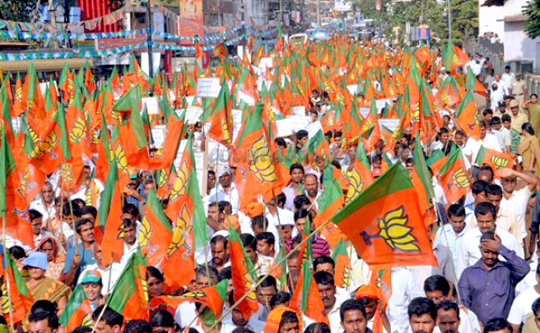Mar 12: A landslide win in UP and Uttarakhand has taken the ruling alliance closer to getting the President of its choice when incumbent Pranab Mukherjee's tenure ends in July.

Though the NDA's vote share in the electoral college will still be short of majority, the gap can easily be narrowed if it can strike a deal with one or two non-UPA parties like Biju Janata Dal (BJD) and AIADMK. The President is elected by the members of an electoral college consisting of elected members of both the Houses of Parliament and the elected members of the legislative assemblies of states and the Union Territories of Delhi and Puducherry.
The NDA was short of 75,076 (value of votes) from the majority mark in the electoral college (having value of votes of 10,98,882 in total) before the results of the five states — Uttar Pradesh, Uttarakhand, Punjab, Manipur and Goa, were declared. The emphatic wins for BJP in UP and Uttarakhand have, however, now helped the NDA to cut this shortfall to just 20,000.
This gap can easily be bridged if the NDA can rope in parties like BJD and AIADMK and independent MPs and MLAs for the presidential polls. If BJD supports the NDA candidate, it will contribute 17,433 votes by virtue of having 117 MLAs in Odisha assembly. Similarly, AIADMK can pitch in with 23,584 votes if it decides to go with the NDA candidate. The party has 134 MLAs in the Tamil Nadu assembly.
The assembly results of UP and Uttarakhand will also ultimately help the NDA improve its numbers in the Rajya Sabha — a must for getting key legislations passed in the Upper House. But it will happen only in April next year when both these states together report 11 vacancies due to retirement of existing members. The change in Rajya Sabha numbers will, however, not have an impact on the presidential election, which is due in July. By-polls to three Lok Sabha seats are due in April. But, result of three seats will not significantly affect the presidential poll scenario.
Though the NDA, with a tally of 75, will continue to be a fair distance from the majority mark of 123 in the Rajya Sabha, Saturday's victories will somewhat shorten the gap by next year. The result of other three states will also not alter the Upper House's arithmetic in 2017. Goa is the only one among the five states which will report a vacancy in the Upper House this year when its lone RS seat will fall vacant on July 28. Manipur and Punjab will, in fact, not report any vacancy during the current phase of the NDA rule till May , 2019.
The NDA is, however, expected to boost its numbers next year when the Rajya Sabha will report a total of 68 vacancies. Fifty-eight out of the 68 vacancies will be reported in April, 2018. Ten vacancies will be reported from UP while one from Uttarakhand. The other states which will report vacancies next year include Delhi, Kerala, MP , Andhra Pradesh, Karnataka, Bihar, Gujarat, Telangana, Rajasthan, Odisha, Jharkhand, Maharashtra, Haryana and Sikkim.
Since the NDA has majority in Jharkhand, Andhra Pradesh, Madhya Pradesh, Rajasthan, Maharashtra, Gujarat and Haryana, the biennial election next year will help it in significantly improving its current numbers in the Upper House.







Comments
Add new comment